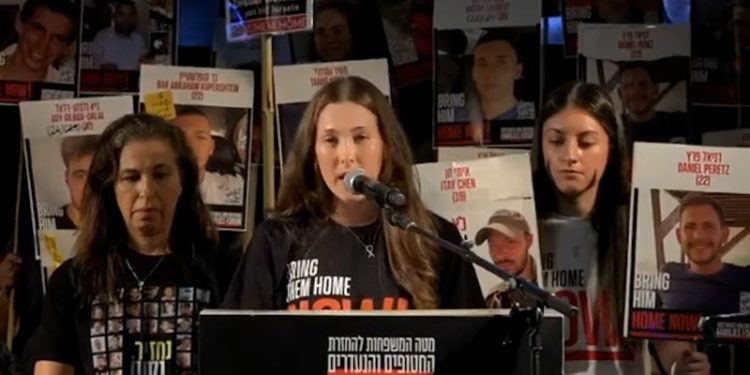An Israel Defense Forces (IDF) soldier released during a ceasefire-hostage deal has said one of her biggest fears during captivity were strikes carried out by Israel.

Na’ama Levy, one of five IDF female soldiers released in January, made the comments during a weekly rally at Tel Aviv’s Hostage Square on Sunday demanding the return of hostages.
“They (strikes) come unexpectedly. At first you hear the whistles, you pray that it won’t fall on us, and then – the explosions, a noise so loud that it paralyzes the body, and the ground shakes,” Levy told a crowd of thousands.
“Every time, I was sure that this was the end of me. It was one of the scariest things I experienced there and that’s also what endangered me more than anything,” she continued, describing an incident where a strike caused the house she was in to partially collapse.
“That was my reality. It’s their reality now,” she said, referring to those still in captivity.
“Even now, at this very moment, there are hostages who hear those whistles and explosions, they’re there trembling with fear. They have nowhere to run, only to pray and cling to the walls with a terrible feeling of helplessness.”
The comments from Levy come as the families of Israeli captives held in Gaza intensify their criticism of Israeli Prime Minister Benjamin Netanyahu and as Israel comes under growing pressure to end the war in Gaza.
Earlier this month, Netanyahu said that defeating Israel’s enemies is the “supreme objective” and more important than securing the release of the remaining hostages in Gaza – drawing backlash from representatives of hostage families.
Levy urged for the return of all Israeli hostages, saying there will be “no victory” otherwise.
“There’s no way in (Israel) they really understand what we’re going through and are still leaving us in Gaza.”
In the early months of the war, another Israeli hostage expressed similar fears of being killed by Israeli strikes, Israeli media outlet Ynet reported, based on audio it said was leaked from a meeting between released hostages, their families, and Netanyahu.
The fear was that “it would not be Hamas, but Israel, that would kill us, and then they would say Hamas killed you,” said the hostage, who was released in one of the first deals.
Levy’s comments on Sunday also came after Netanyahu appointed a new chief for the country’s Shin Bet security agency on Friday, Maj. Gen David Zini, who has reportedly voiced opposition to hostage deals. The families of hostages have blasted the choice.
According to Israel’s Channel 12 News, Zini said in meetings of IDF general staff: “I oppose hostage deals. This is a forever war.” The report does not provide a specific date for Zini’s comments. Channel 12 says it was a position he repeated often over the past year.
“If the report is accurate, these are shocking statements, worthy of unequivocal condemnation, especially coming from someone who is expected to hold the fate of the hostages in his hands,” the Hostages and Missing Families Forum said in a statement at the time.
In his previous position as the head of the Training Command and General Staff Corps in the IDF, Zini had little influence on hostage negotiations. But as head of the Shin Bet, he could have a significant role considering the agency’s participation in previous rounds of indirect negotiations with Hamas.
“Appointing a Shin Bet chief who prioritizes (Prime Minister Benjamin) Netanyahu’s war over the return of the hostages is a sin upon a crime and an injustice to the entire people of Israel – a blow to the value of solidarity and the sacred duty to leave no one behind,” the forum said.
In recent weeks, Israel has come under growing pressure to end the war in Gaza as the enclave faces widespread starvation amid a severe shortage of humanitarian aid.
The United Kingdom has paused trade talks and sanctioned extremist settlers in the West Bank. Canada and France have threatened sanctions. And the European Union – Israel’s biggest trade partner – is reviewing its landmark Association Agreement with the country. In the words of one Israeli minister, their patience has worn thin over Israel’s decision to expand the war.
The kidnapping of Levy emerged as one of the first to make headlines as the Hamas-led October 7 attack unfolded.
Video released by Hamas showed Levy, who was aged 19 at the time, being dragged by her hair at gunpoint with her hands bound.















